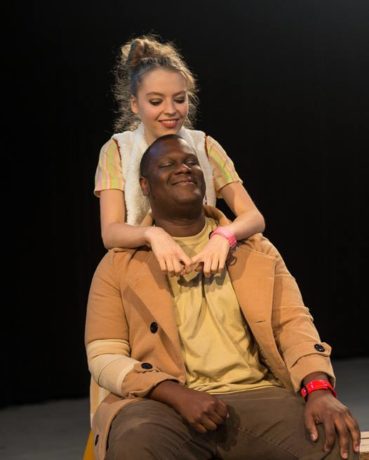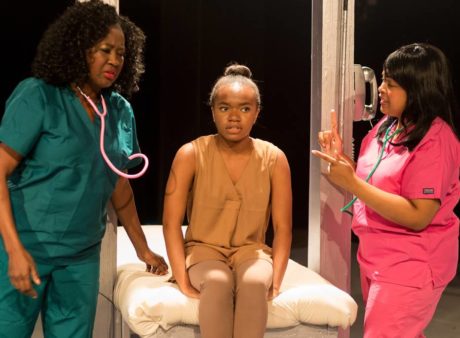One-act plays are tricky beasts. Playwrights must balance tension with plot and story. Too little tension, and the audience is left bored, slogging through countably interminable minutes until the lights and bows at the end. Too much, and the ending resolution can feel rushed and unearned. Story often wants to unspool at its own pace, in its own time, but the playwright of a one-act isn’t allowed that luxury. She has to wrangle the story, her characters, the point, and the resolution into a concentrated space, where the seams and stitches often easily show.
But done well, they’re intense experiences for those in the audience. The truth is there, front and center, and for so brief a time that it almost has to be perfect to make an impact that isn’t, “…and?”
The final weekend of Silver Spring Stage’s 2017 One-Act Festival brings its five final plays out, each examining an uncomfortable question: What is left for a playwright with no talent? (Muse by Rachel Teagle.) What is left for a woman who feels she’s run out of romantic options? (One Click Away by Dean Fiala.) What do our dogs know about their own mortality, and their own grief? (Stay by Dagney Kerr.) Does a new body need a soul to know what love is? (A Womb with a View by Rich Orloff.) And, if a Beatles fan dies in his apartment, will I, Mike Bevel, start caring about the Beatles? No, I will not, even if the one-act is very funny. (Death and the Beatles Fan by Stephen Kennedy.)

Of the five plays, Stay, directed by Aly Cardinalli, is the clear standout – though it’s in tough competition with Womb and Beatles Fan. Matt McCarthy, a time-beaten German Shepard named Sammie, and MerryRose Howley, a younger, energetic pup named Maggie, meet in a park to discuss quotes from Emerson, the TV series Homeland, and Sammie’s cancer, which Sammie won’t survive. Death is both assured, and still surprising, for all of us. Watching two friends, however, who happen to be dogs, negotiate goodbye, clears away the human confusion of guilt and bargaining and we’re left with this bright kernel of grief at the center that we can worry with our tongue. McCarthy and Rose are both incredibly heartbreaking and totally believable as their canine characters – whether it’s the way they cock their heads simultaneously when learning to appreciate a tree, or how Rose assuredly balances Maggie’s energy against McCarthy’s gruffer, older wisdom. Playwright Kerr was blessed with two incredibly intelligent and committed actors, and the one-act lands perfectly as Sammie leaves the stage and I broke down in tears.
(During the curtain call, on Friday night, I’ll describe this lovely moment to you that you missed unless you were there: As McCarthy and Rose took their bows, Rose, maybe still a little in character, peeked at McCarthy out of the corner of her eye to make sure they were bowing in unison. Intentional or not, it broke my heart all over again and I manfully cried in a manly way that probably looked different from a distance.)
Orloff’s A Womb with a View, directed by Leigh K. Rawls, opens in a hospital, with a young woman (The New Kid, delightfully inhabited by Ariana Caldwell) sitting tensely on a bed, nurses around her taking vitals and recording contractions. But Orloff has switched the players on us, and the young woman on the table is about to be a brand-new human – if the nurses can get her ensouled and out of the womb. The play is smart and sharp, and the cast is, too. Nicolas Miles as The Supervisor can steal the show away from his other cast members with a raised eyebrow and a “gurrrl.” But Lanita Wright and Sunday Sabbath (as Assistants A and B) pull focus right back, whether it’s arguing over how many appendixes a human should have, or who was last responsible for getting the soul down off the shelf and placed within The New Kid. Meanwhile, Apryl Motley’s Technician has some of the best reaction faces on the stage.
Womb’s main concern – and what The New Kid struggles with the most – is: why do we have souls if all they do is cause us pain and heartache? Orloff’s play argues that the soul is necessary for us to understand and fully experience love. “I have a brain, don’t I?” The New Kid asks. “It’s not enough,” she’s told. But is a soul something that we have, or something we earn? “Real isn’t how you are made,” the Skin Horse explained, in a different story, to a velveteen rabbit. “It’s a thing that happens to you.” A soul, probably, isn’t something that needs to be accounted for in our manufacturing; it seems as if it would happen whether we wanted it to or not – like birth, and death.
The third high-performer of the night was Kennedy’s Death and the Beatles Fan, directed by Bruce Hirsch. It’s silly, gets the job done quickly, and works as well as it does no doubt because Mickey MacIntyre (as Anthony “Tony” Black) and Melanie Kurstin (as Death) are having such a wonderful time inhabiting the silly premise: Tony, a man who loves the Beatles too much, meets Death, uninvited, one night in his living room. Tony is young(ish), this can’t be his time, his taste in music is suspect (sample Beatles lyric: “yeah yeah yeah” or “haaaaaaaaaaand”), and yet still Death comes, and she’s not in the practice of taking no for an answer. “Can we play chess?” Tony bargains. “Do you know how to play chess?” Death counters, and he can’t, of course, because he’s a Beatles fan. What he can do, though, he thinks, is challenge Death to a game of Beatles-themed trivia, and Death, for her own reasons, agrees.
Kurstin is brilliant as Death. She moves across the stage with a sexy seduction (and a gorgeous pair of shoes that would get her on any drag stage in the greater D.C. area), her body sometimes still, sometimes coiled like a snake. “I’m death,” she tells Tony. “I can do sh*t.” And MacIntyre matches Kurstin’s brilliance. He’s manic, desperate optimism as he hopes to thwart the unthwartable; she’s patient, almost a lover, as she waits for him to tire himself out and accept the unacceptable. Kennedy’s play is more silly than poignant, and yet still taps at that terror and desperation we all grapple with when we contemplate our own mortality. “We are but older children, dear, who fret to find our bedtime near,” Lewis Carroll once wrote.

Fiala’s One Click Away, directed by Elizabeth Zitelli, feels like an episode of the television show Black Mirror if Carrie Bradshaw wrote it – and that’s not shade at all. It is fun and frothy, but feels more SNL sketch than it does a full one-act. Singleton of a certain age Jenna (a perfectly believable Carolyn Heier) has come home from a date with a high schooler who also happens to be the son of her yoga instructor. (Another reason to never take up yoga, by the way.) She didn’t know he was a high schooler from his profile on a dating site – and she especially didn’t know about his mom. Her friend, Veronica (the very funny Paroma Sanyal), explains that there’s an end to this madness if Jenna only knew: Amazon, turns out, offers more than troublingly discounted books and fat-free gummy bears. Husbands can be got, with overnight shipping even, and for cheap, if one has Prime.
Everyone in this cast – from Heier and Sanyal, to Matty Griffiths’s turn as a patient package deliverer to Husbands #2 (Jim Pasquale, who is a gorgeous sobber) and #3 (Scott D’Vileskis) – commits to Fiala’s premise. With such a talented cast, I would have loved to see them given the opportunity to explore ideas of disposable desire and later-life romance. There will come a point where it’s the comfort of familiarity that is so intoxicating, rather than the actual intoxicants that fueled so much of those early days of chemistry and attraction – and Heier conveys world-weary hope so well.
(Sometimes a one-act – or even a full play – can have one element too many that distracts more than illuminates the action. In One Click Away, for a reason that isn’t explored or explained, Veronica is asexual. In some ways, Fiala uses Veronica’s asexuality to explore, from a beginner’s perspective, what might be driving Jenna’s quest for sexual and romantic companionship. But since that could have been accomplished just as easily without Veronica’s unexamined asexuality, I found myself too concerned with that plot element for longer than I think was necessary or helpful to my understanding of the play.)
Teagle’s Muse, directed by Stuart Fischer has moments, but ultimately doesn’t entirely coalesce. It takes the longest of the five plays to tell its story, but I’m not entirely sure what we’re supposed to leave with when the lights come up and Sarah Nechamen (who has been playing Lydia) helps Alex Hyder (as B) off with his bear head. It seems to end several times before shaking its head a little and carrying on, so each epiphany gets buried under more spectacle. (Like, for instance, a man in a bear’s head.)
Lydia is a struggling young playwright who spends a lot of time on the floor, hiding under her desk, avoiding her Muse, played by Diane Hutter, who just wants Lydia to write something. Lydia wants to write something too – whether it’s a lyric poem about children eaten by bears, or a play that we see take life as she works through it on the stage. She just doesn’t know how to do it, or where to begin, or even why she’s writing in the first place. But the problem is this: watching someone make art is only interesting if that artist is Bob Ross and you’ve enjoyed some special brownies that your cool aunt Linda makes because she remembers Berkeley and wears a lot of turquoise jewelry. The play even acknowledges this at one point, with the Muse admonishing Lydia that metatheatricals aren’t as interesting as she might think they are. (Allowances will be made for Pirandello’s Six Characters in Search of an Author.)
Lydia’s problem is that she’s too young, and her character, as written, is too amorphous. We don’t know anything about her life, about any pain she’s felt, unless we’re to believe that the lines she gives to her character, A (Leilani Parks), come from some past experience. But then we’re back to Lydia’s age, again, where she feels too young to have been bruised into the deep cynicism that A displays when she yells at B (before he dons a bear’s head for reasons that you’ll just have to muddle through on your own). There are decades of insecurity revealed by A when she taunts B’s lack of sexual prowess and lack of noxious ownership that sound important and necessary, but with no place to land. There’s no sense of connection with anything deep within Lydia, and the lines she gives to her characters, who have magically appeared in her house. The play then just becomes some interesting – and sometimes funny – moments that have no connective tissue, and take us nowhere useful as an audience.
If the five plays presented on this last weekend are themed around uncomfortable questions, they’re also, in various ways, and in various modes of explicitness, themed around death and mortality. As a whole, the evening offers a lot to think about and discuss on the drive home, even for the plays that weren’t quite as successful.
Running Time: 2 hours and 15 minutes, with one intermission.
Silver Spring Stage’s 2017 One-Act Festival plays through August 27, 2017, at Silver Spring Stage – 10145 Colesville Road, in Silver Spring, MD. Tickets are available at the door, or purchase them online.
LINKS:
Silver Spring Stage’s 2017 One-Act Festival, Weekend Two, by Molly Murchie
Silver Spring Stage’s 2017 One-Act Festival, Weekend One, by Susan Brall





